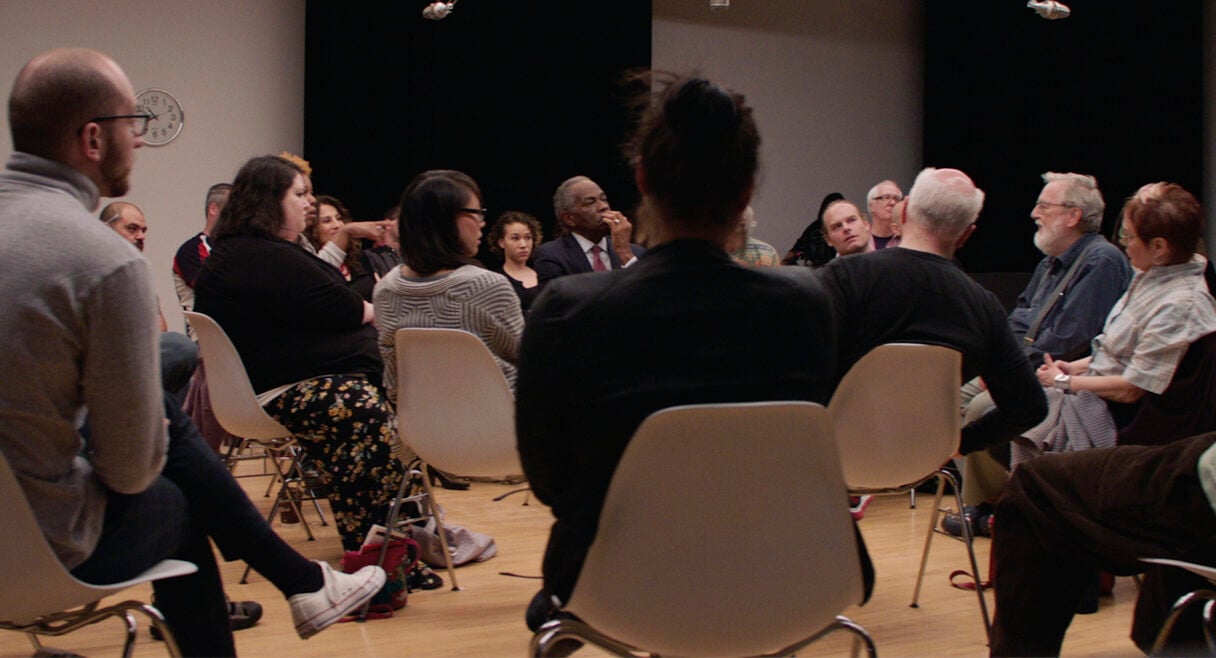FREE EVENT
GALLERY HOURS:
Tues-Sat 10am-5pm
VENUE: UNSW GALLERIES
Participants in a group dynamic grapple with the emergence of complex patterns of stereotyping and other projections of identity.
“…Leigh Ledare’s The Task is “a movie for anyone who” has ever been paralyzed with resentment when told they need to check their privilege—but then, maybe it’s for those whose disabusement has yet to begin…” BOMB magazine
The Task, 2019
Single Channel Video and Sound
Duration, 118min
Leigh Ledare filmed The Task during a three-day Group Relations Conference—a psychosocial method developed by London’s Tavistock Institute—that the artist organized in Chicago. In addition to directing the film crew, Ledare assembled the 28 participants and secured the collaboration of 10 psychologists trained in the method. During a sequence of small and large group meetings, the group studies its own self-made social structure—an abstract “task” that allows participants to examine the identities, roles, desires, and biases individuals import into the group, as well as conscious and unconscious group dynamics. Ledare introduces one key modification, however: the presence of a camera crew and the artist as observers and collaborators. This intervention shifts the “here and now” orientation of the conference by making the members of the group aware of the effect of external social and technological forces. By complicating authority and boundaries among all members—including the artist—Ledare calls attention, by analogy, to power structures that govern our relations to one another in a society where we are increasingly both observers and observed.
Presented in seven chapters, The Task focuses on four large group meetings, each of which includes all the 28 participants, three psychologists (or “consultants”), six camera operators, three observers—and Ledare himself, whose role evolves over the course of the conference. Throughout the film, the group’s members grapple with the emergence of complex patterns of stereotyping and other projections of identity; authority is questioned, assumed, and then taken away; and viewers are implicated as the participants negotiate the subjective forces that exceed the structured constraints of the self-made system.
Leigh Ledare
Leigh Ledare creates work that raises questions of agency, intimacy and consent, transforming the observer into the voyeur of private scenes or situations dealing with social taboos. Using photography, the archive, language, and film, he explores notions of subjectivity in a performative dimension, his interventions putting in tension the realities of social constructions and the projective assumptions that surround them. Ledare’s projects have been exhibited extensively in the US and abroad. Recent exhibitions include:
The Plot, The Art Institute of Chicago (2017); Vokzal, The Box, Los Angeles (2017); Place du Jardin aux Fleurs, Office Baroque, Brussels, as well as numerous group exhibitions including the 2017 Whitney Biennial, The Whitney Museum of Modern Art, New York; and Manifesta 11, Zurich (2016).
Ledare’s work has also been the subject of major surveys at Charlottenborg Kunsthal, Copenhagen (2013), and WIELS Contemporary Art Centre, Brussels (2012). Publications by Ledare include: Double Bind Conversations (Art Resources Press, 2015), a book length dialog co-authored with Rhea Anastas; Ana and Carl and some other couples (Andrew Roth, 2014), a collaboration with Nicolas Guagnini; Leigh Ledare, et al. (Mousse Publishing, 2012), edited by Elena Filipovic; (Leroy Neiman Center for Print Studies, Columbia University, 2012), a photolithography edition; (MFC-michèle didier, 2012); and Pretend You’re Actually Alive (PPP Editions and Andrew Roth, 2008). Ledare’s work is in the public collections of The Museum of Modern Art, New York; The Art Institute of Chicago; The Museum of Contemporary Art, Los Angeles; The Hessel Museum of Art, Bard College, Annandale-on-Hudson, New York; The Centre Pompidou, Paris; and Fotomuseum Winterthur, Switzerland. In 2017 Ledare was awarded a John Simon Guggenheim Foundation Fellowship.

